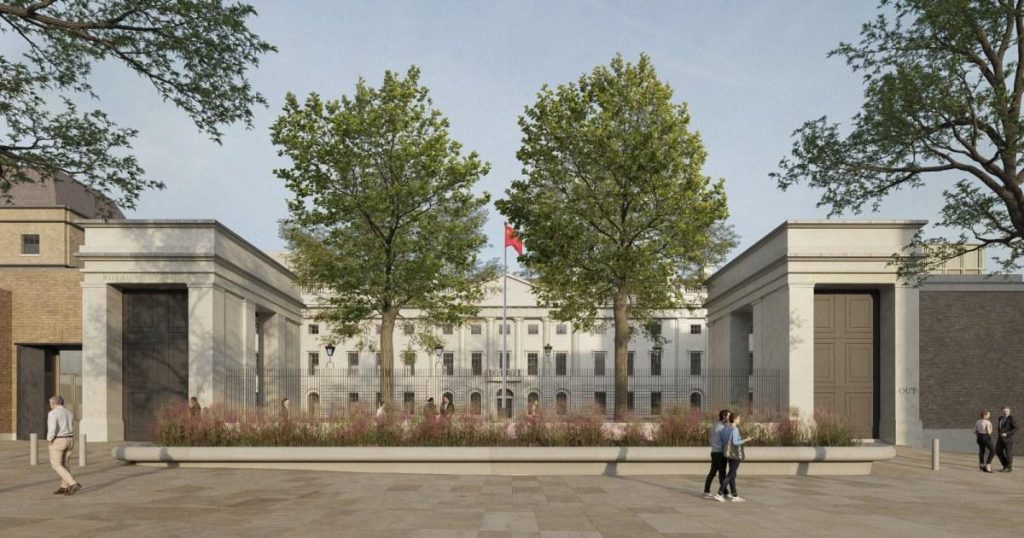The proposed transformation of London’s former Royal Mint building into the Chinese embassy has ignited a firestorm of controversy, pitting national security concerns against diplomatic protocol and raising questions about potential government influence. China’s plan envisions the creation of Europe’s largest embassy, a sprawling complex situated in the heart of Tower Hamlets, a mere stone’s throw from iconic landmarks like the Tower of London. While the proposal has garnered support from some cabinet ministers, it has drawn sharp criticism from UK intelligence agencies, the Metropolitan Police, and local residents, all voicing anxieties about the implications of such a significant diplomatic presence.
At the heart of the security debate lies the building’s proximity to vital communication cables, a vulnerability that has raised red flags within MI5. Intelligence officials fear the embassy’s location could expose these critical infrastructure lines to potential sabotage or espionage, jeopardizing national security. Adding to the security concerns is the anticipated rise in protests and demonstrations that the embassy is likely to attract. Counter-terrorism police have expressed concerns about the strain this would place on resources, potentially diverting officers from other essential frontline duties. Furthermore, the close proximity of the proposed embassy to historic sites like the Tower of London has sparked fears about the potential impact on these culturally significant locations, raising concerns about the preservation of national heritage.
The embassy project also raises broader questions about the UK’s relationship with China. The proposed “super embassy” would be located just four miles from the similarly expansive US embassy in Nine Elms, a symbolic juxtaposition highlighting the complex geopolitical dynamics at play. Tower Hamlets Council initially rejected the proposal in 2022, but the intervention of cabinet ministers has injected new life into the project, raising eyebrows and prompting accusations of undue influence. Deputy Prime Minister Angela Rayner is slated to make the final decision in October after China resubmitted its proposal, largely unchanged, following Labour’s election victory last year.
The controversy deepened further when Foreign Secretary David Lammy and Home Secretary Yvette Cooper penned a joint letter to Tower Hamlets’ Planning Inspectorate, emphasizing the importance of facilitating diplomatic premises for foreign nations in capital cities. They also asserted that the Metropolitan Police had withdrawn their initial objections, a claim that has fueled suspicion and skepticism. Councillor Peter Golds slammed the letter as a blatant attempt to sway an independent inquiry, raising questions about the government’s motivations and the transparency of the decision-making process. Critics argue that the sheer scale of the proposed embassy, coupled with its location in a world heritage site and adjacent to the City of London, a global financial center, amplifies the potential risks. Golds has called for greater transparency from the government regarding its discussions with China on the matter and demanded an explanation from the Met Police about their apparent reversal of position.
Adding another layer of complexity to the situation is the timing of the government’s renewed push for the embassy. The intervention comes shortly after Chancellor Rachel Reeves returned from a trip to China, and Foreign Secretary David Lammy also visited the country last year. These visits have fueled speculation that ministers are attempting to appease Beijing, raising concerns about potential compromises on security and national interests. Shadow Home Secretary James Cleverly has questioned the timing of the call-in, asking whether Rayner received advice from the Foreign, Commonwealth and Development Office (FCDO) and why she bypassed London Mayor Sadiq Khan’s authority.
The proposed Chinese embassy has become a lightning rod for a broader debate about balancing the need for diplomatic relations with safeguarding national security and preserving local interests. The controversy highlights the complexities of navigating international relations in an increasingly interconnected world, where the pursuit of diplomatic engagement must be weighed against the potential risks to national security, critical infrastructure, and cultural heritage. The final decision on the embassy project will not only shape the landscape of Tower Hamlets but also send a powerful message about the UK’s approach to its relationship with China, and its willingness to prioritize national security concerns in the face of diplomatic pressure. The ongoing debate underscores the need for a thorough and transparent assessment of the project’s potential implications, ensuring that all relevant security, cultural, and local concerns are fully addressed before a final decision is made.


